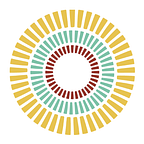Our Periods Should Be a Source of Pride and Power
Driven to end the stigma she faced as a teenager in Rwanda, Blandine is changing the way women and girls experience their periods.
For two years after my first period, I did not ask for sanitary pads by name. I would call them hygiene products, school materials, or even clothes — trying to find a better name for my parents’ ears so they would help me buy what I needed.
The day of my first period, I was afraid to ask my mother what happened to me. I thought that I sat on a tree and maybe its branches injured me. The second day, I realized that that blood was not normal and I had to discover how to stop it or how to hide it by myself.
My clothes became a mess. I cut some of my clothes into pieces to try to stop the blood. I would change these scraps every 30 minutes and I had to hang the pieces of my clothes outside to dry after washing them, which caused me embarrassment. I didn’t know how to talk about my need for sanitary pads or how to use them.
Despite my burden of shame, I went to a neighborhood friend who was the same age as I was and asked her if she ever experienced what I was feeling and seeing in my body. She told me how she too experienced shame when she had to use rags and mattress stuffing to manage her periods. This was before she knew about sanitary pads, which she explained to me and taught me how to use.
Even with this new knowledge, I continued to face challenges due to the cost and the stigma of buying sanitary pads. I am not alone. According to Sustainable Health Enterprises, 18% of women and girls in Rwanda miss work or school because they can’t afford to buy menstrual pads. This amounts to a potential GDP loss of $215 per woman every year in our country.
Social stigma and cultural taboos about menstruation contribute to girls missing work and school. In my community, when you go to buy a pad it is common for the seller to wrap it in multiple envelopes or even cover it with newsletters and pack it as if it is shameful to carry it.
That shame reflected from the seller in the boutique is the same shame my father reflected on me when I started asking him for money to buy sanitary pads every month. I had to start asking for that money one week ahead to bear with the fear that his responses caused in me. One morning, I was standing on the stairs where my father would pass every day for work. I asked him for money again and I will never forget his reply: “Stop those things that make you ask me for 700 francs every month!”
This was the moment I realized I would not get support from the one I thought was in charge of me. I had to learn what to ask and to whom to ask it to. I had to take pads on credit from my neighbor’s boutique or take debt from my friends and pay them back from holiday jobs. Luckily, with this help I didn’t miss any class because of my periods.
But I saw my colleagues missing class some days because they didn’t have hygiene products, or they missed class because they were working for money to buy pads. I stopped asking “why me?” about my situation and started asking “how me?” How could I help all Rwandan girls out there in the same situation or even worse situations than mine?
I have been humbled to get help from all those kind people around me and I swore I would give back. I thought about the shame surrounding a natural part of becoming a woman; the shame that was causing us to wish not to be girls anymore; the shame that made us forget about the gift of reproduction we have been given.
I created Cosmos Multimedia Center, a media house, magazine, and healthcare app. We create an environment where girls can meet in a safe space and read our magazine and books that educate and explain about hygiene products they need and how to use them. They read true stories about other young women’s experiences in handling their menstrual cycles; they share their own challenges and experiences and plan together what they can do to turn their periods into something that can exist without shame.
We also plan to start an incubator for young women and girls to not only discuss their challenges about menstruation, but also learn how to make pads for themselves and other school girls. As girls break the silence about menstruation and benefit financially from making and selling pads, they will come to see their periods as a source of pride and power.
If we stop raising our voices about this issue, the number of school dropouts will increase. Remembering my own menstruation challenges, I know I have to work hard to protect other girls from the same discouraging experiences I had. We are equipping parents with information to provide an affectionate and psychologically supportive environment to their children.
Through Cosmos publications and activities, girls learn how to handle their menstrual cycles each month. Our goal is to see all school-aged girls learning every day — in Rwanda and throughout Africa — without having to worry about their monthly cycle at school. I have been a child of the community; now it’s my turn to give back to the community.
This story originally appeared on WorldPulse.com, a social networking platform connecting women worldwide for change. In the lead up to Menstrual Hygiene Day (May 28), share your own experiences with menstruation for a chance to be published. We’ll be curating stories from all over the world in the coming weeks. Learn more.
